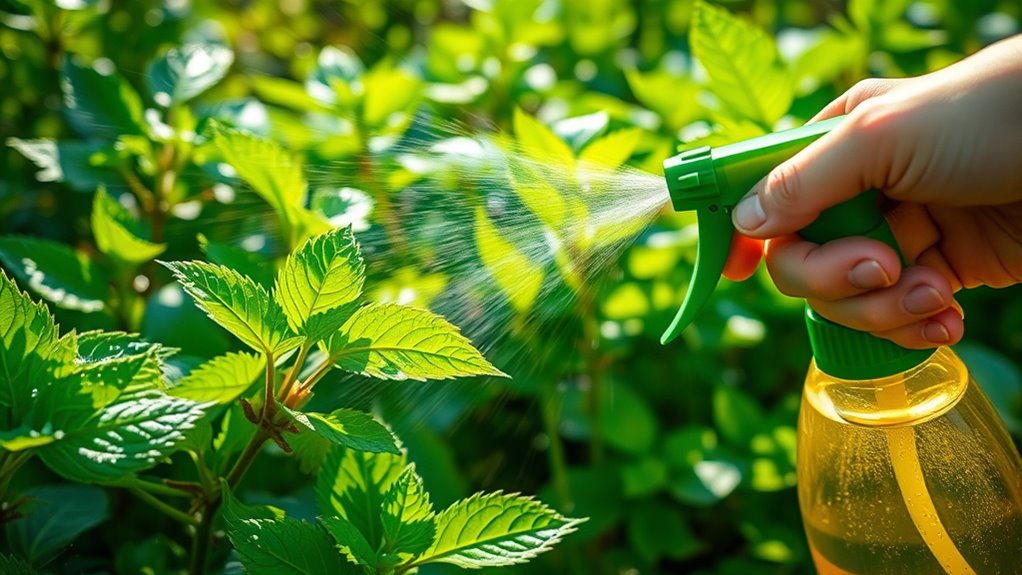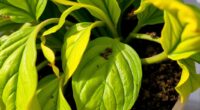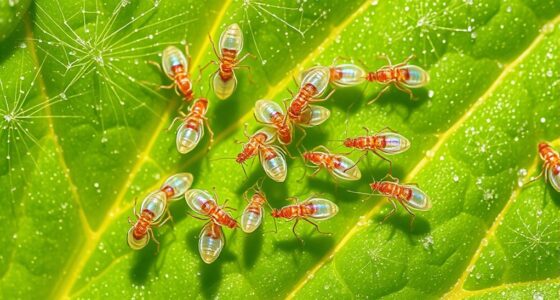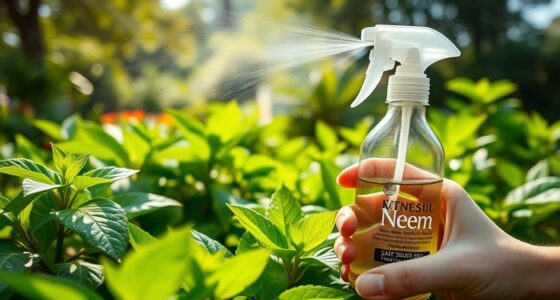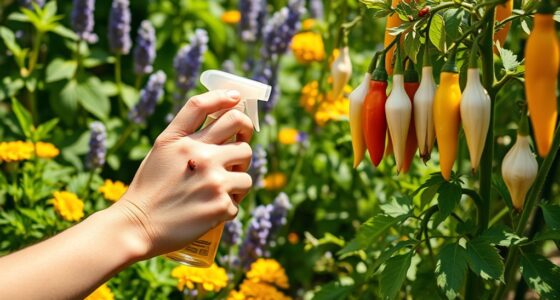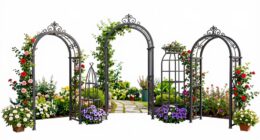To safely use neem oil on your plants, always follow the manufacturer’s instructions, dilute it properly with water and a little soap, and spray during early morning or late evening to avoid leaf burn. Wear protective gear and keep it away from children and pets. Apply every 7 to 14 days for best results, but adjust if plants show signs of stress. Want to learn more tips for effective and safe neem oil use? Keep exploring!
Key Takeaways
- Always follow manufacturer instructions and dilute neem oil with water and a small amount of soap for effective coverage.
- Apply neem oil during early morning or late evening to prevent phytotoxicity and protect beneficial insects.
- Wear gloves and protective eyewear, and keep neem oil away from children and pets during handling.
- Avoid spraying on stressed or drought-affected plants, and skip application before rain to maintain effectiveness.
- Use neem oil regularly every 7 to 14 days as part of an integrated, eco-friendly pest management strategy.
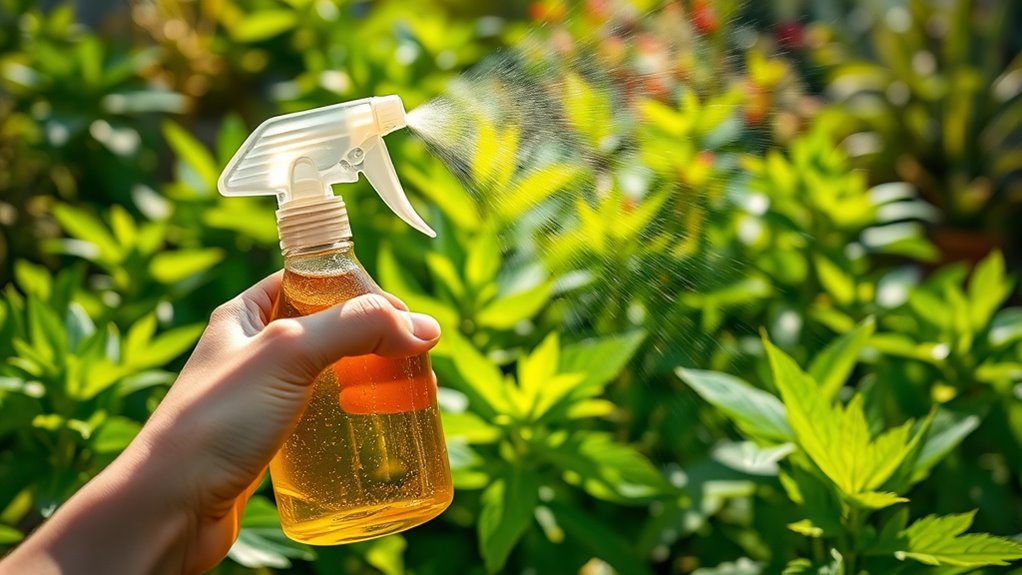
Neem oil is a popular natural remedy for pest control and plant health, but using it safely is essential to avoid potential risks. When you incorporate neem oil into your gardening routine, especially if you’re dedicated to organic gardening principles, it’s important to understand how to apply it correctly. Neem oil works as a natural insecticide, targeting pests like aphids, whiteflies, and spider mites without harming beneficial insects when used properly. Its effectiveness makes it a favorite among gardeners seeking environmentally friendly solutions, but improper use can cause damage to your plants or create unintended environmental effects.
To maximize benefits and minimize risks, always follow the manufacturer’s instructions closely. Typically, you’ll want to dilute neem oil before spraying it on your plants. Using a spray bottle or garden sprayer, mix the neem oil with water and a small amount of soap to help it adhere better. Applying during the early morning or late evening helps avoid damaging your plants from the sun’s intense rays, as neem oil can cause phytotoxicity if applied during peak sunlight hours. Also, avoid spraying on plants that are stressed or under drought conditions, as they might be more sensitive.
When using neem oil in your organic gardening efforts, consistency is key. Regular applications every 7 to 14 days can help keep pests at bay without overwhelming your plants or harming the environment. Be mindful of the weather forecast; avoid applying neem oil before rain, as excessive moisture can wash it away and reduce its effectiveness. Additionally, if you notice any signs of leaf damage or distress after application, reduce the frequency or concentration of your spray. It’s also useful to understand that contrast ratio can impact how well you see details on your plants, especially in varying light conditions.
Safety is vital when handling neem oil. Always wear gloves and protective eyewear to prevent skin and eye irritation. Keep neem oil out of reach of children and pets. When used properly, neem oil is a safe, sustainable option that aligns with organic gardening practices, but misuse can lead to issues like leaf burn or unintended harm to beneficial insects. Remember, the goal is to create a balanced, healthy garden ecosystem, so avoid over-reliance on any one method of pest control.
Frequently Asked Questions
Can Neem Oil Be Used on Edible Plants Safely?
You can use neem oil on edible plants, but you need to prioritize edible plant safety. Always follow neem oil regulations and product instructions carefully to avoid contamination. Wait the recommended time before harvesting, and wash your plants thoroughly. Using neem oil responsibly guarantees your plants stay healthy without risking your health. Remember, proper application and adherence to safety guidelines are key to safe, effective use on edible plants.
How Often Should I Apply Neem Oil to My Plants?
You should apply neem oil every 7 to 14 days, depending on your plant’s health effects and pest presence. Regular application helps control pests without harming your plants, but overdoing it can cause leaf burn or stress. Keep an eye on your plants and adjust the application frequency if you notice any adverse effects. Consistent, moderate use guarantees your plants stay healthy and pest-free.
Is Neem Oil Safe for Pollinators Like Bees?
You’re wondering if neem oil is safe for pollinators like bees. Generally, bees and neem can coexist if you apply neem oil carefully. To protect pollinator safety, avoid spraying during bloom times when bees are active. Use neem oil in the early morning or evening, and follow label instructions. This way, you minimize harm to bees while effectively controlling pests, ensuring your plants stay healthy and pollinators remain safe.
Can Neem Oil Be Mixed With Other Pesticides or Fertilizers?
When considering mixing neem oil with other pesticides or fertilizers, you need to perform compatibility testing first to prevent plant damage. Always check labels and wait for the right application timing—preferably early morning or late evening—to reduce plant stress. Avoid combining neem oil with harsh chemicals unless you’re certain they won’t react negatively. Following these steps ensures safe and effective use, protecting your plants and the environment.
What Are the Signs of Neem Oil Over-Application on Plants?
Think of your plants like delicate dancers on a stage. Over-application of neem oil can cause foliar damage, making leaves look scorched or spotty, like burned costumes. You might see leaf curling or yellowing, signaling you’ve gone too far. Keep an eye out for these signs—if they appear, reduce your neem oil use immediately. Proper application guarantees your plants stay healthy and vibrant, like a well-choreographed performance.
Conclusion
Remember, neem oil is a powerful natural remedy, but like any tool, it needs careful handling. When used responsibly, it protects your plants without harm; when misused, it can cause damage just as easily as pests. Think of neem oil as a gentle giant—strong enough to defend your garden but gentle enough to harm if not used correctly. Respect its strength, follow safety guidelines, and enjoy a healthy, thriving garden that’s safe for both your plants and your family.
